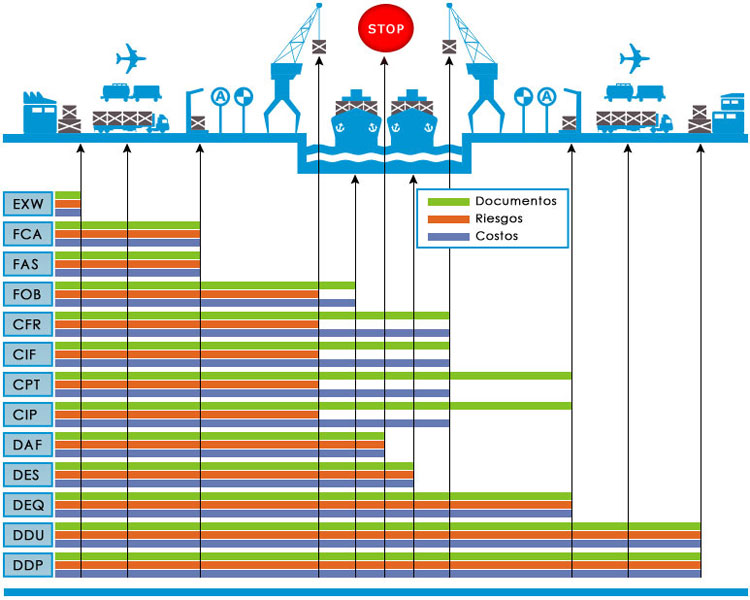| INCOTERMS 2000 | ||
Language is one of the most complex and important tools of International Trade. As in any complex and sophisticated business, small changes in wording can have a major impact on all aspects of a business agreement. Word definitions often differ from industry to industry. This is especially true of global trade. Where such fundamental phrases as "delivery" can have a far different meaning in the business than in the rest of the world. For business terminology to be effective, phrases must mean the same thing throughout the industry. That is why the International Chamber of Commerce created "INCOTERMS" in 1936. INCOTERMS are designed to create a bridge between different members of the industry by acting as a uniform language they can use. Each INCOTERM refers to a type of agreement for the purchase and shipping of goods internationally. There are 11 different terms, each of which helps users deal with different situations involving the movement of goods. For example, the term FCA is often used with shipments involving Ro/Ro or container transport. INCOTERMS also deal with the documentation required for global trade, specifying which parties are responsible for which documents. Determining the paperwork required to move a shipment is an important job, since requirements vary so much between countries. Two items, however, are standard: the commercial invoice and the packing list. INCOTERMS were created primarily for people inside the world of global trade. Outsiders frequently find them difficult to understand. Seemingly common words such as "responsibility" and "delivery" have different meanings in global trade than they do in other situations. In global trade, "delivery" refers to the seller fulfilling the obligation of the terms of sale or to completing a contractual obligation. "Delivery" can occur while the merchandise is on a vessel on the high seas and the parties involved are thousands of miles from the goods. In the end, however, the terms wind up boiling down to a few basic specifics:
It is essential for shippers to know the exact status of their shipments in terms of ownership and responsibility. It is also vital for sellers & buyers to arrange insurance on their goods while the goods are in their "legal" possession. Lack of insurance can result in wasted time, lawsuits, and broken relationships. INCOTERMS can thus have a direct financial impact on a company's business. What is important is not the acronyms, but the business results. Often companies like to be in control of their freight. That being the case, sellers of goods might choose to sell CIF, which gives them a good grasp of shipments moving out of their country, and buyers may prefer to purchase FOB, which gives them a tighter hold on goods moving into their country. In this glossary, we'll tell you what terms such as CIF and FOB mean and their impact on the trade process. In addition, since we realize that most international buyers and sellers do not handle goods themselves, but work through customs brokers and freight forwarders, we'll discuss how both fit into the terms under discussion. INCOTERMS are most frequently listed by category. Terms beginning with F refer to shipments where the primary cost of shipping is not paid for by the seller. Terms beginning with C deal with shipments where the seller pays for shipping. E-terms occur when a seller's responsibilities are fulfilled when goods are ready to depart from their facilities. D terms cover shipments where the shipper/seller's responsibility ends when the goods arrive at some specific point. Because shipments are moving into a country, D terms usually involve the services of a customs broker and a freight forwarder. In addition, D terms also deal with the pier or docking charges found at virtually all ports and determining who is responsible for each charge. Recently the ICC changed basic aspects of the definitions of a number of INCOTERMS, buyers and sellers should be aware of this. Terms that have changed have a star alongside them.
EXW (EX-Works)
FOB (Free On Board)
FCA (Free Carrier)
FAS (Free Alongside Ship)*
CFR (Cost and Freight)
CIF (Cost, Insurance and Freight)
CPT (Carriage Paid To)
CIP (Carriage and Insurance Paid To)
DAT (Delivered At Terminal)
DAP (Delivered At Place)
DDP (Delivered Duty Paid)
|

